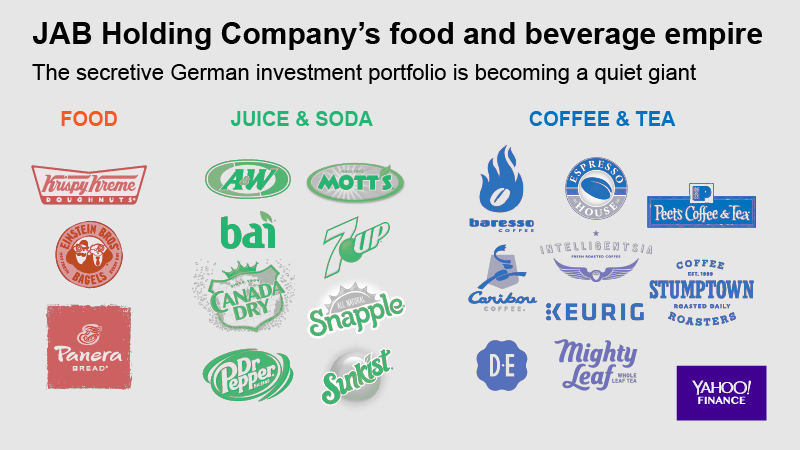Keurig-Dr Pepper Snapple acquisition makes German food powerhouse JAB even bigger
Keurig Green Mountain is buying Dr Pepper Snapple Group (DPS) for $103.75 per share, in an $18.7 billion tie-up that will put all three brands into one unit called Keurig Dr Pepper. But the biggest winner is JAB Holding, the private, family-owned German company that owns Keurig.
By swallowing Dr Pepper Snapple Group, JAB adds Dr Pepper, Snapple, Canada Dry, 7 Up, A&W, Sunkist, Mott’s, and Bai juice to its litany of food and coffee chains: Panera (which it bought last year for $7.5 billion), Peet’s, Krispy Kreme, Keurig, Green Mountain, Caribou, Mighty Leaf, Stumptown, Intelligentsia, Jacobs Douwe Egberts, Espresso House, Baresso, and Einstein Bros Bagels.
Many devotees of some of these brands, especially Intelligentsia or Stumptown, likely have no idea their favorite “third-wave” hipster coffee shop is German-owned.

Keurig Dr Pepper will have combined annual sales of $11 billion. That’s still much smaller than Pepsico and Coca-Cola, which in 2016 had annual sales of $63 billion and $41 billion, respectively.
“The combination of Dr Pepper Snapple and Keurig will create a new scale beverage company which addresses today’s consumer needs,” Keurig CEO Bob Gamgort says in a press release. JAB chairman Bart Becht adds, “We are very excited about the prospect of KDP becoming a challenger in the beverage industry.”
To compete as a “challenger,” employees of the newly combined entity can expect cost-cutting. Keurig Dr Pepper “aims for realizing $600 million in synergies” by 2021, JAB says in its press release. (That sounds like layoffs.) JAB also touts Keurig’s financial performance since going private, citing “renewed top-line volume growth, increasing U.S. household penetration for Keurig brewers to 20%, from 17%, in the last two years” and “pod growth from the lowsingle digits to mid-single digits in the second half of calendar year 2017.”
JAB: Nearly 200 years of German business history
JAB, formed in 2011 by the descendants of German chemist Ludwig Reimann, is the current incarnation of a business that dates back to 1828. It is named for Johann Adam Benckiser, who was Reimann’s father-in-law and business partner. Each of the four Reimanns who co-own JAB are billionaires; they are also extremely private and do not typically talk to press. The company is now headquartered in Luxembourg.
As the company has grown its footprint in the food industry, it has sold off its fashion holdings. Just one year ago, JAB Luxury housed Bally, Belstaff, and Jimmy Choo. JAB has since sold off Belstaff and Jimmy Choo. JAB still owns Coty, an extensive fashion portfolio that includes Calvin Klein, Clairol, Covergirl, OPI, and Marc Jacobs. Coty is publicly traded on the NYSE, but JAB is its controlling stakeholder.
After JAB sold off Jimmy Choo last summer, Yahoo Finance Editor-in-Chief Andy Serwer commented, “It’s worth knowing about JAB, because I don’t think this is the last we’re going to hear of them.”
Six months later, JAB is behind the largest soft-drink deal ever. And the company is likely to keep making more big food moves from here.
—
Daniel Roberts is a senior writer at Yahoo Finance who often covers food and coffee. Follow him on Twitter at @readDanwrite.
Read more:
How grocers feel about Amazon: ‘There was fear before, there’s a lot more fear now’

 Yahoo Finance
Yahoo Finance 